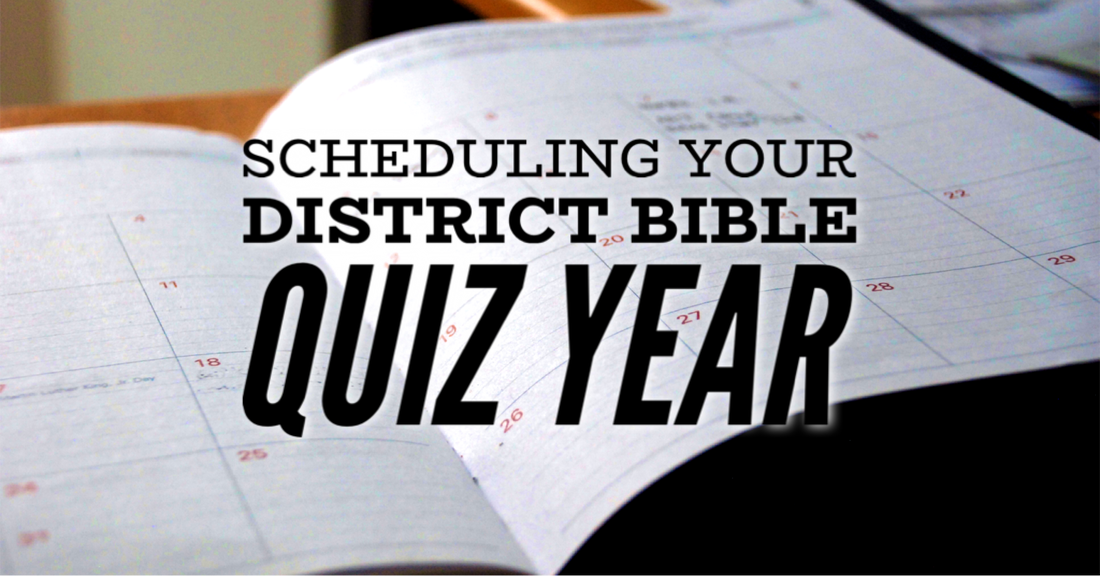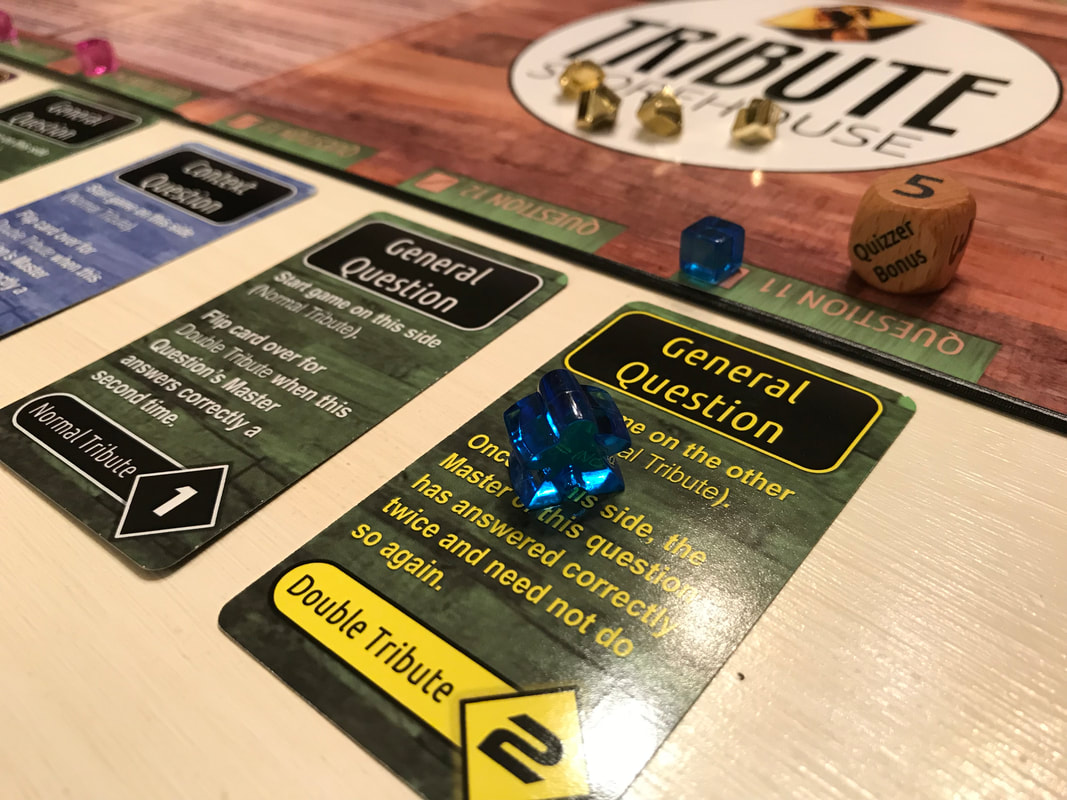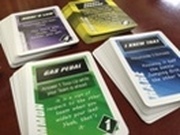DISCLAIMER: Nothing here is intended to make the reader critique their own DQD who operates differently. We have many, many districts that participate in Bible Quizzing, and each has their director. Each situation is different, and each director is different. What works for one person in one place, may not work for someone else who is somewhere else. The following can be taken as an approach that worked for me, at different times and in different places – and maybe other directors can glean something from it, even without strictly following it. I fully support other DQDs in what they decide to do on their districts.
When To Start
In conjunction with that – will you have a district-wide kickoff event? Either a day, or a weekend, that signifies to everyone that it’s time to get started? This can be a good way to recruit new teams and new quizzers. You can use it to introduce chapter 1 or 2 – or some later chapter if that seems good to do. You might cover a certain chapter for those who want to study in advance, and cover a “surprise chapter” for those who are new or have not started to study yet. It can be fun to have your more experienced quizzers serve as officials instead of quizzing. This lets them sit on the other side of the table, and allows the rest of the quizzers to have more success, from not having to go up against them.
Most years I directed on Chicago Central (CCD) we had a Quiz Retreat in mid/late August over Friday, Saturday and Sunday. Friday was just an introduction, Sunday was awards and banquet, and Saturday was all-day quizzing and other fun. Experienced quizzers officiated, and we had 4 divisions – breaking up Novice and Experienced, as well as advance studiers and those who hadn’t started. We might have averaged about 10 quizzers in each of the four groups. But the circumstances were right for holding those. Our district still owned a campground, we had a pastor’s wife (and quiz mom) who brought a crew of ladies to buy the food and fix the meals, and the district was pretty compact, so traveling to our campgrounds wasn’t a big deal. If you cannot pull off a 3-day Quiz Retreat, a 1-day event could still have many benefits. When I was on the Rocky Mountain District (RMD) it would have been difficult to even do that, but I was thinking about it…
When to End
When you conclude your District Quiz Season usually depends on two things. One – when is your Field Event? Two – does your District NYI require you to finish at a certain time?
Did you know there used to be a rule that District Quiz Finals must be held within (no sooner than) 46 days from the start of the Regional (Field) Quiz? In my early years directing, I was scrupulous about following this rule. I later noticed that not everyone else seemed to do so. And at some point – I didn’t even notice when – this rule went away. And in some cases, a District NYI wanted Bible Quizzing to finish much earlier than this because there was some advantage in early registrations for Regional/Field Events.
So when is your Field Event? These don’t all happen right at, or about, the same time. Some are early/mid-April, two are not until Memorial Day weekend at the end of May! The rest are somewhere in between. I still think it’s a good idea to take your district quiz season up to within 4 to 6 weeks of your Field Event, if that’s alright with District and Field leadership. I would suggest about 4 weeks for districts on those earliest Fields, and up to 6 weeks for districts on those later Fields. There are advantages to lengthening the district quiz season. One is that it gives more time to sufficiently cover and learn each year’s quiz material. Another is that going longer takes your season closer to year-end quizzes that follow your district season – which can encourage participation in those events. Events like Fields, a Q-quiz, Nationals at General Assembly, or NYC are much easier to attend if your season ends 2-3 months before them rather than 4+ months before them. Additionally, participation in these events will greatly enhance your District Bible Quiz Ministry.
When I was on the Rocky Mountain District, the dates for District Finals were set by our big annual district youth event, called ‘Rejoice!’ Because of the sheer size of the district (all of Wyoming and all of Montana – about 1000 miles from corner-to-corner, this was an all-in-one event. It included Bible Quizzing, the Talent and Sports you would have on your District leading up to the Field Event, Youth Worship Services, a Service Project, the District NYI Convention, and the District NYI Council Meeting. On Rocky Mountain, it is tough to come together, so when you do you cover all the bases you can. All-District Youth Events were Summer Camp and Rejoice! We still had the rest of the Bible Quiz season to plan. My previous preference would be to always separate Bible Quizzing from those other events, but the scheduling there allowed quizzers to take part in all the other events which alleviated my concern about the combination.
The Middle
I tried to incorporate one or two weeks of break over the Christmas season. As much as quizzers hope to put in extra time to catch-up then, it rarely happens. However, the downtime is good, and they need it. There are periods where some down time does more good for quizzers than a bit more intense study – that is, if they are otherwise doing the intense study. I would aim for about 2-3 weeks of review time from when the last chapter was covered to District Finals, if possible. And if I was aware that a particular chapter might need extra time – I tried to allow for that. Or at least allow for two weeks for teams to get started on chapter 1 – because the extra week can do brand new quizzers a lot of good (“What? I was supposed to STUDY?”). You may want to make your pace work with neighboring districts, or with mid-season open invitational tournaments that your teams like to attend.
Then you need to pick dates for your quizzes. Set the amount of material by where this falls on your pace. You need to watch for dates to dodge – dates to avoid holding quizzes: holidays, District NYI events, other District events, those invitational quiz tournaments, etc.
Some like to hit a consistent weekend – for instance the second, or third, or fourth Saturday of each month. Then maybe shift a week when something conflicts with that weekend. You could also aim to have the same number of weeks apart. Every third month will typically have a fifth Saturday – so you might space quizzes four weeks apart, which causes a shift. Then maybe a greater space at certain other times, as needed.
My ideal schedule most years was to have our weekend Bible Quiz Retreat in August, to hold seven district invitationals – one per month from September through March. I tried to cover all chapters at our March Quiz, before we had District Finals. Then I aimed for early- to mid-April for District Finals – dodging Easter, and Palm Sunday Weekend.
One pitfall to avoid is continually scheduling each year’s quizzes on the closest date to the previous year’s quizzes. Unless adjusted, the quizzes will gradually get earlier each year – by one day most years, by two days for the next 12 months after a Leap Day. In 10 or 11 years of doing this, you could move your dates two weeks forward.
When I had my dates and chapters, I got on the phone and started scheduling churches. I’ve found that some directors do this differently. For instance, some pick their dates, and ask quiz teams to schedule the date or dates they want to host. I prefer taking the lead on locations. Then I can spread them around the way I’d like, trying to balance them across the district. In addition, I would schedule churches that did not have a quiz team as well as those that already did. It’s a great way to gain exposure and develop interest.
It's important to complete your schedule as early as possible – to get those dates established on the calendar. Then it’s important to communicate your schedule widely. To those who have been involved in Bible Quizzing in the recent past, to every church and pastor on your district, to the District leadership and the District NYI leadership. Get the word out! And I advise putting it into a one-page document that’s ideal for printing and posting on a refrigerator or some place like it, rather than just inserting it into the body of an email or other electronic means of communication.
Ideas and SUggestions
- I always scheduled a December Quiz. Many districts in our area send teams to the St Louis Quiz. Some of those districts don’t hold a district quiz in December. Before I ever directed, I observed elsewhere that where there was no December quiz the quizzers who did not go to St Louis sharply dropped off from November to January. They went two months without a quiz! And if you need to cancel your January quiz because of bad weather – you might have quizzers go THREE months without a quiz. I would always try to hold a quiz the weekend after the St Louis Quiz.
- Before long, I made a change to our December Quizzes. Instead of adding the new chapters, as we normally did each month, we quizzed in December on ONLY the new chapters! If, for instance, November’s quiz was on chapters 1-12, we might cover only 13-15 or 13-16 in December. It was a nice little break. This motivated quizzers who had gotten behind to push their study on those new chapters and try for a big day. Also, covering only the new chapters made the day seem a little more low-key, which was nice moving into Christmas. The way St Louis is scheduled, the Saturday will always be December 1-7 making the Saturday after between the 8th and 14th. Not TOO close to Christmas yet!
- Some have tried holding a December quiz the weekend of St Louis for those who do not go. This is good if you have the leadership to cover and would rather not have all your leadership attend a quiz two consecutive weekends. Have them pick one weekend at one place or the other.
- We had a stretch of years where things were going really well, we had many teams, many quizzers, and many churches involved. So at the November Quiz we started selecting our Top 20, not just our Top 10. The Top 10 still went to St Louis. The second 10 went to a neighboring district to quiz as our C and D Teams. This other district had a smaller program, did not have a high level of competition, and didn’t quiz off-district until Regionals. Therefore, we set it up with their director to hold a quiz on St Louis weekend at one of their churches near our districts’ border and quizzed their local teams versus our C and D District Teams. We had a lot of fun, made great friendships, and this other district showed vast improvement year-over-year as we continued. I stopped doing it after four years as some of our quizzers were TRYING to make the second 10 instead of the first because the trip developed a fun reputation. But by then it had accomplished its purpose.
- As we grew and it became harder to find enough facilities that could host us all and it was hard to give our teams enough quiz rounds each month, I began to schedule “split-quizzes”. We would meet on the same day, at two different locations – depending on your church’s location. We had the leadership to cover it and it was a great opportunity for leadership development. We started with the December Quiz which made it even more of a break because it involved less travel and the day could be shorter with fewer teams. We worked up to where we were split two ways in October and February, four ways in December, and had full district invitationals in September, November, January, and March. We had 12 different churches hosting our invitational quizzes, plus one more hosting District Finals – which was great! This was good for a time, but eventually quizzers began to study less for those split quizzes because not everyone would be there.
- Try not to schedule over your District Children’s Bible Quiz Finals. In fact – become a friend to your District Children’s Bible Quizzing Director! Try to help them in their role. The goal is to increase bonds and to encourage children’s quizzers to become teen quizzers.
- In fact, you might try having one or two combined Children’s/Teen Quizzes each year. We did this the years I served as Children’s Director on Chicago Central. Then when I became Teen DQD on Rocky Mountain, I was surprised because the Children’s Director approached ME about the possibility of doing some quizzes together. I was thrilled! Again – we want to see young people move from one to the other. We want to promote the idea that the Church of the Nazarene has a wonderful Bible Quiz Ministry for grades 1 through 12. It’s simply separated into two different components for younger ones and older ones. Many adults – pastors and parents – are involved in both. Teen quizzers can help by score keeping at children’s quizzes, and children’s quizzers can be exposed to teen quizzing. This is a great area where we all benefit from mutual support.
- In addition, while on Rocky Mountain District I began to schedule more all-district quizzes, taking a chance on the weather holding up for us. In the most difficult travel months – December and January there, and sometimes February – I would schedule two different quizzes on two consecutive weeks, the first in Wyoming and the second in Montana. I was in Wyoming, and so were most of our more established teams and leaders. As we had good opportunities for new teams at our Montana churches, I needed to enable myself to travel up to Montana to make those quizzes happen.
- I’m all for trying different things. Some DQDs have tried things I haven’t even imagined! You’re taking a chance when you try something different. It may not work out like you think it will, or like you want it to. But that’s alright. Then you try something else. If you never try, you’ll never know.
- I know of a district that tried to split the quiz season into two shorter seasons – with a long break in between. Essentially to make it more like the length of a high school sport season. I’m not sure how that worked for them. But it was sure an interesting idea.
By the Books
- Acts (28 chapters) – Acts is a long book. Our books that are 28 or 29 chapters can be hard to schedule if your district quiz season is constrained to 30 or 31 weeks. As stated, it is great to have a week at Christmas and at least two weeks of review from finishing the last chapter to holding District Finals. Additional “off-weeks” beyond that are gravy! With Acts, chapter 2 is long, and is almost certain to have many memory verses every year. I suggest allowing two weeks for Acts 2, if you can at all, and encourage your quizzers to learn all those memory verses, especially the new quizzers. This means that optimally you’d like to have at least 32 weeks, and 33 is better, from the point when your quizzers start studying Acts until District Finals.
- Galatians, Ephesians, Philippians, Colossians, Philemon (21 chapters) – these books, GEPCP for short, ARE short. But that can be deceptive. They’re also DENSE! They are just packed! Maybe having so many books adds to the complexity – just keeping straight what is in which book. Sometimes a director will carry over the accelerated pace from Acts into GEPCP. But that’s just brutal for quizzers. We hit this set in my third year as DQD, and we happened to have a group of highly motivated quizzers who wanted to achieve all they could in study and competition. I set us up for what I considered a “memorizer’s pace” – we covered three chapters each four weeks, so they could study it, absorb it, review it – and master it! As we went to off-district quizzes in mid- to late-fall, and into early winter, we ran into some shell-shocked quizzers whose districts began with a faster pace. One told us, “We usually cover five chapters per month. Galatians and Ephesians had six chapters, so we added one more and covered six chapters each month.” So basically at our October quiz we covered Galatians 1-6 while this district covered Galatians 1 to Ephesians 6. I know of at least two districts that stopped advancing for a month or two so that their quizzers could catch up. However, for the most part, those quizzers never really caught up and just continued to struggle all year. Conversely, our group had a great year and I think it was largely due to taking the slow pace. Pace is important – and it’s important to understand how difficult some of the shorter books can be – because of the complexities involved in the material. I encourage you to take advantage of having fewer chapters by progressing at a slower pace.
- Luke (24 chapters) – Luke is the only season with 24 chapters. We need to be a little bit cautious about scheduling Luke aggressively – especially in the first half of the chapters. Luke actually has more verses than any of our other BQ Books. By pages in my Bible, it seems like it’s about 5% longer than either Acts or Matthew (just in case the verses are shorter, on average). But check this out for early chapters – 1 (80), 2 (51 – Christmas Story), 3 (38, Genealogy), 4 (44), 5 (39), 6 (49) – not too bad yet – 7 (50), 8 (56), 9 (62), 10 (42), 11 (54), 12 (59). They shorten up a bit after that – mostly in the 30’s and 40’s until the last three chapters. But that’s 372 verses from chapters 5-12, an average just above 53. It’s very difficult for quizzers to maintain a pace of one chapter every week in that stretch. So I suggest throwing in an extra week each month at certain stretches in Luke. If you have the luxury of 7 invitationals, for instance, you might cover through: 3, 7, 10, 13, 17, 21 and then 24.
- When I directed over Luke on the Chicago Central District in 2000-01, I tried something different. Several years later, a young lady who quizzed with us told me (jokingly, I hope) that she still had nightmares about it. Instead of starting with chapter 1, we started with chapter 3, and advanced chapters from there through the first part of the year. Of course, we always had a Christmas theme going with our December Quizzes, which were on only the new chapters. By November – we covered maybe Luke 3 through 12 or 13, whatever it was. Then we had our December Quiz on Luke 1-2 – the Christmas Story! I figured our quizzers could study 1 and 2 earlier, on their own, for off-district quizzes. And they knew a lot of that information anyway. But it sure was fun to quiz on just the Christmas Story from Luke at Christmastime! After December, our quizzes covered chapter 1 through whichever we had reached.
- 1 & 2 Corinthians (29 chapters) – This has one more chapter than Acts, and has some of the complexity of the other epistles. But I think it’s not quite as complex as some. It’s a bit more straightforward with less abstract theology and more “where the rubber meets the road” theology. I recommend an approach similar to Acts – a one-week break at Christmas and 2-3 weeks between the last chapter and District Finals, if possible. If you need to combine two chapters in one week just to stay on track, there are some places in 2 Corinthians that might be optimal – where you have consecutive short chapters. 1 Corinthians has some short chapters, but they seem to be separated by long chapters.
- John (21 chapters) – This is another great opportunity to put in three weeks of advancement and one week of review for every four weeks. Add three chapters when your quizzes are four weeks apart. Great stuff!
- Hebrews, 1 & 2 Peter (21 chapters) – This material also gets complicated – especially the first half or so of Hebrews. This is yet another that benefits from a pace of three chapters every four weeks.
- Matthew (28 chapters) – This is the same number of chapters as Acts and could use a similar approach. Matthew’s genealogy is in chapter 1, so you may want to allow some extra time there. The Sermon on the Mount is Matthew 5-7, so it is nice to keep those together.
- Romans and James (21 chapters) – Once again, 21 chapters, and once again I advise resisting the temptation to constantly add one chapter per week and to instead add three chapters for every four weeks. Add a fourth chapter only if you have five weeks between quizzes, preferably.
What do you think is most important about scheduling a quiz year? Is there anything in particular that you have tried? Or any ideas you’d like to try?






 RSS Feed
RSS Feed